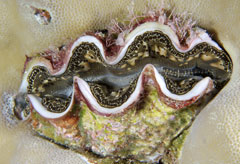Rare mollusc detects illness
Rare mollusc can sense when humans are under the weather

Rare mollusc can sense when humans are under the weather
A rare mollusc has been used to develop a test to detect when a human is about to fall ill.
The piddock is just two inches long, resembles a clam and lives on rocks across the British coast.
The creature glows in the dark whenever it comes into contact with chemicals produced by human white blood cells. These cells protect us from disease and increase in number when the body is fighting illness.
The discovery has been made by a husband and wife team – both doctors – based in Plymouth, who are farming the molluscs to remove the protein that prompts the blue glow.
Their ground-breaking discovery will be employed to help British Olympic athletes preparing for the games in Beijing to show sportsmen if they are likely to become ill or are stressed.
Dr Robert Knight and his wife Dr Jan have been giving advice to both sports coaches and nutritionists as well as supervising the sailing squad.
Marie Claire Newsletter
Celebrity news, beauty, fashion advice, and fascinating features, delivered straight to your inbox!
'We can tell if people are training too hard, because their white cells get hectic,' Dr Robert said. 'We can also see the beginnings of infection, so a physician can prescribe antibiotics early on.'
The leading destination for fashion, beauty, shopping and finger-on-the-pulse views on the latest issues. Marie Claire's travel content helps you delight in discovering new destinations around the globe, offering a unique – and sometimes unchartered – travel experience. From new hotel openings to the destinations tipped to take over our travel calendars, this iconic name has it covered.
-
 The 10 best dresses celebrities from Tiffany & Co.'s Blue Book 2025 Gala
The 10 best dresses celebrities from Tiffany & Co.'s Blue Book 2025 GalaCelebrating the brand's marine-inspired collection
By Sofia Piza
-
 These are the 11 cult designer buys of spring 2025—and they're already selling out
These are the 11 cult designer buys of spring 2025—and they're already selling outFrom Miu Miu's must-have cowboy hat to Loewe's latest bag
By Clementina Jackson
-
 Prince William and Princess Kate have announced their 14th wedding anniversary plans
Prince William and Princess Kate have announced their 14th wedding anniversary plansBy Jenny Proudfoot